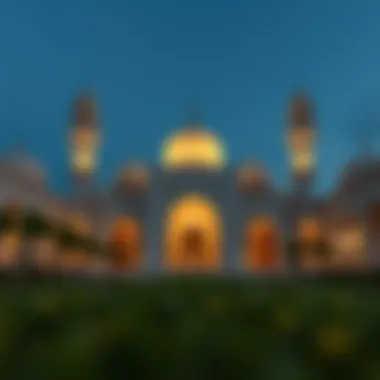Ramadan Suhoor and Iftar Timings Guide 2023


Intro
As the crescent moon emerges, it signals the holy month of Ramadan—a time steeped in spirituality, reflection, and community. The rhythm of daily life shifts dramatically during these 29 or 30 days, particularly when it comes to the important practices of Suhoor and Iftar. Understanding the timings of these meals is not merely a matter of ritual; it encapsulates cultural significance and helps to nurture the bonds within families and communities.
This guide aims to illuminate the vital aspects of Suhoor and Iftar timings in 2023, delving into their relevance and the impact they have on daily lives. By exploring regional variations, one gains insight into how different cultures embrace these moments of nourishment and togetherness. As we navigate through this month, the precision of timing often bears consequences, as late or missed meals can affect the fasting experience. This article intends to prepare you better for Ramadan, diving into not only when to eat, but why these moments are significant at a personal and community level.
Whether you are a devotee eager to maintain the sanctity of your fast, or someone who aims to understand the intertwining of tradition and modernity during Ramadan—this guide caters to you. Let's embark on this journey, focusing on how the timing of these meals influences social and cultural dynamics, while providing helpful scheduling insights for those in vibrant settings like Dubai.
Market Trends
Current Market Dynamics
As Ramadan approaches, it's noteworthy how the atmosphere buzzes with anticipation—particularly within local markets and communities. Restaurants and eateries often scramble to craft special iftar menus, catering to requests that range from authentic Emirati cuisine to contemporary fusion dishes. The influx of consumers brings a renewed vigour to businesses, making Ramadan not just a time of spiritual reflection but also an economic boost for the local economy.
“The flow of business during Ramadan profoundly affects the landscape, creating a unique blend of joy found in communal gatherings.”
Future Forecasts
Looking ahead, one can analyze the trends associated with Ramadan. The shift toward sustainability has influenced many restaurateurs to prepare meals from local and organic sources. As the cultural landscape continues to evolve, adapting these practices could see a significant increase in consumer base, especially as younger generations become more conscious of the environmental impacts of their choices.
Business experts predict that the online food delivery services will continue to flourish, with many families choosing the convenience of breaking their fast at home. This convenience, combined with technological enhancements, could likely alter how Suhoor and Iftar are experienced in the near term.
The Timings
To align with these trends, understanding the precise timings for Suhoor and Iftar is crucial. Generally speaking, Suhoor is taken shortly before the Fajr prayer, while Iftar takes place at sunset. This coherence of time calls for preparation and awareness, especially in regions like Dubai where the fast begins and ends according to astronomical calculations linked to the sun's positioning.
Deep knowledge about these timings not only determines one's personal fasting experience but also lays the groundwork for community gatherings, and local cultural events—making it an intrinsic element of the Ramadan experience. To maximize participation in communal Iftars, many plan their schedules while considering the local prayer times that vary slightly each day.
In summary, as Ramadan approaches, understanding its impact is paramount, from cultural implications to local economic factors all tying back to Suhoor and Iftar timings. The synergy of tradition and modernity during this month manifests in various ways, ultimately enriching lives and fostering a sense of togetherness amidst the spiritual journey.
Understanding Ramadan
Ramadan is not merely a month on the Islamic calendar; it is a revered period that embodies spiritual reflection, self-discipline, and communal solidarity. For many Muslims around the globe, this holy month serves as a reminder of the power of faith and the importance of empathy. Embracing the essence of Ramadan goes far beyond abstaining from food and drink from dawn until dusk; it delves into the heart of a culture rich in tradition and deep-rooted spirituality. Understanding the multifaceted nature of Ramadan is essential for anyone wishing to engage meaningfully with this time of year.
To grasp the significance of Ramadan within the context of this article, it is critical to explore both its historical and spiritual dimensions. Each contributes unique insights that can inform both personal practices and the broader community experience during this sacred observance.
Historical Significance of Ramadan
Ramadan has been observed by Muslims since the 7th century CE, marking the time when the Quran was first revealed to the Prophet Muhammad. This historical backdrop creates a profound connection between contemporary practices and original teachings. For many, participating in Ramadan allows individuals to cultivate a deeper sense of connection with this legacy.
Through fasting, one can appreciate the trials faced by those who have less, reinforcing the need for compassion and generosity. This echoes the sentiments found in many Islamic teachings about charity and community, making the month a significant period for spiritual and communal growth.
"Fasting is a shield; it protects from the fire and shields one from sin."
Moreover, the historical events tied to Ramadan serve as a reminder of perseverance and the transformative power of faith. In understanding the roots of Ramadan, we also unlock an appreciation for its cultural expressions, such as unique culinary traditions and nightly prayers, which vary from region to region.
Spiritual Objectives
At its core, Ramadan is about attaining a higher level of spiritual consciousness. The fast, observed from dawn until sunset, encourages Muslims to engage in prayer, self-reflection, and community bonding. Each day spent fasting is a step towards self-improvement and a chance to foster a stronger connection to Allah.
During Ramadan, there is a notable focus on the following spiritual objectives:


- Heightening one’s awareness of God: Fasting serves as a reminder of one’s devotion and the importance of spiritual life.
- Encouraging self-discipline: The act of fasting requires control over one’s bodily desires, leading to enhanced self-regulation that extends beyond Ramadan.
- Fostering compassion: By experiencing hunger, fasting cultivates empathy for those who struggle, prompting charitable actions through acts of kindness and donations.
- Building community ties: Breaking the fast together during Iftar strengthens communal bonds, illustrating the shared experiences among Muslims worldwide.
Understanding these spiritual objectives enriches our insight into how Ramadan serves not just as a time of personal reflection but as a vital communal experience that resonates across diverse cultures. It challenges individuals to grow, transforms communal dynamics, and encourages a greater commitment to humanitarian values.
The Role of Suhoor and Iftar
The role of Suhoor and Iftar during Ramadan extends beyond mere acts of eating; they embody significant practices in the hearts and minds of Muslims around the globe. These meals are not just scheduled interruptions of fasting but are insteadcentral to the spiritual and communal aspects of this holy month. Their importance can be dissected into various elements, each supporting the physical, spiritual, and social dimensions of Ramadan.
Definition of Suhoor
Suhoor is the pre-dawn meal that serves as the last nourishment Muslims take before fasting begins. Typically consumed in the hours before Fajr, or dawn, it is recommended to be eaten as close to the Fajr prayer as possible. This meal is crucial as it enables individuals to sustain their energy levels throughout the day's fast. It acts as physical preparation as much as it does spiritual, allowing the faithful to approach the day with clear intentions and reinforced resolve.
It often includes a hearty mixture of foods that provide lasting energy. Common items on the Suhoor table might include
- oats or whole grains,
- yogurt,
- fruits, and
- plenty of water to ensure optimal hydration.
These choices aim to combat the fatigue and dehydration that can come from prolonged fasting.
Definition of Iftar
Iftar marks the end of the daily fast with the breaking of the fast at sunset. Muslims often break their fast with dates and water, following the tradition of the Prophet Muhammad. This symbolic start to Iftar is daintily cherished among communities. As the sun sets, families gather around the dining table to enjoy meals together, often featuring dishes rich in flavor and cultural diversity. From samosas in South Asia to harira in Morocco, the variety is immense and reflective of local customs.
The act of breaking the fast not only provides physical nourishment but also fosters a deeper sense of unity and gratitude. It serves as a reminder of the community’s collective faith and the blessings gathered throughout the day.
Nutritional Importance
The nutritional aspects of both Suhoor and Iftar are paramount for sustaining health during Ramadan.
- By prioritizing nutrient-dense foods in Suhoor, individuals can set a strong foundation for their fasting day, promoting health and well-being. This helps stabilize blood sugar levels, reducing the chance of carbohydrate cravings and sugar crashes later in the day.
- Following a day of fasting, Iftar counteracts nutrient deficiencies caused by prolonged fasting. Including protein-rich foods and a variety of vitamins and minerals in Iftar can help replenish the body effectively.
- Hydration is crucial during both meals. Drinking ample water in Suhoor and after Iftar helps balance fluid levels and reduces the risk of dehydration.
"Eating wisely at Suhoor and Iftar is not just about quelling hunger but nurturing the spirit and body, making the holy month a holistic experience."
Ultimately, understanding the roles of Suhoor and Iftar illuminates their significance well beyond the act of eating. As one navigates through Ramadan, appreciating these meals as integral to the spiritual journey fosters a more fulfilling experience.
Timings for Suhoor and Iftar in
Understanding the timings for Suhoor and Iftar is pivotal during Ramadan. These moments mark the beginning and end of daily fasting and serve not just as functional times, but as significant spiritual milestones. Observing these timings with precision enhances one's experience and commitment to the practice.
Overview of Fasting Timings
Fasting during Ramadan has specific timings outlined that coincide with the break of dawn and sunset. Generally, Suhoor, the meal before dawn, needs to be consumed before the Fajr prayer. Conversely, Iftar, which is the meal to break the fast, typically occurs at sunset, marked by the Maghrib prayer.
Factors like seasonal changes contribute to the variation of these timings. As Ramadan shifts throughout the solar calendar, the duration of the fast can be longer or shorter depending on the geographical location. It’s essential for individuals to know their local parameters to maintain the spiritual essence of the fast.
- Tip: Keep a local prayer schedule handy to ensure you are eating at the correct times.
Daily Timing Adjustments
Throughout Ramadan, the timing for Suhoor and Iftar will adjust slightly each day. As a rule of thumb, Muslim communities often consult local mosques for precise timings, ensuring they are aware of changes from the previous day.


Most often, Suhoor happens just before dawn, while Iftar usually aligns with the sun setting. Some might find the fasting duration lengthening as Ramadan progresses, which calls for careful planning of meals to maintain energy. Tracking these changes can be simple with apps designed for Ramadan timings or online resources that adjust daily.
Regional Variations in Dubai
Within Dubai, timing for Suhoor and Iftar can reflect significant regional variations, owing to the diversity of the population. For instance, different neighborhoods may have slight differences in sunset times, leading to a diverse experience among communities.
Some expatriates might follow the timings listed in their home countries, leading to an interesting mix at the dinner tables. It’s quite common for individuals to come together at the local mosque or community centers to break their fast as a collective, therefore enhancing the sense of community.
Official Calendars and Resources
For those seeking accuracy, various official Islamic calendars can guide individuals in determining the exact Suhoor and Iftar timings:
- Islamic Affairs and Charitable Activities Department of Dubai: iacad.gov.ae
- Dubai Islamic Affairs: They provide timely updates and alongside prayer schedules relevant to fasting.
Furthermore, many mobile applications can be downloaded for convenience, providing daily alerts to remind users when to eat and when to pray. Websites like timeanddate.com offer detailed prayer timings based on geographic locations.
Staying informed through these resources not only enhances adherence but also cultivates a deeper connection with the traditions of Ramadan.
Cultural Significance of Suhoor and Iftar
The act of breaking fast and the pre-dawn meal during Ramadan are much more than mere rituals. Suhoor and Iftar encapsulate the essence of unity, gratitude, and community spirit. These practices provide an opportunity for individuals and families to reconnect, reflect, and deepen their faith. Understanding the cultural significance behind these meals enables one to appreciate how they shape social interactions and individual experiences during this holy month.
Community Gatherings
As the sun dips below the horizon, neighborhoods buzz with anticipation. Iftar becomes a communal event that transcends the barriers of age, background, and social status. People from different walks of life come together, sharing meals and creating lasting memories. Whether it’s a lavish banquet or a simple gathering with friends, the spirit of generosity flows abundantly.
In many cultures, offering dates and water to fellow Muslims is a symbolic gesture of hospitality. Food isn't merely sustenance—there's an emotional connection as families carry forward their traditions through generations.
Moreover, local mosques often organize community Iftars, inviting everyone to join. This practice promotes communal harmony, fosters friendships, and strengthens the bonds between neighbors. As the adhan (call to prayer) echoes, the sense of unity during this shared experience is palpable, making the moment more meaningful.
"Fasting is a shield; it prevents one from immorality and transgression." — Prophetic Saying
Family Traditions
At the heart of Ramadan festivities lay family traditions that breathe life into the Suhoor and Iftar experience. Each family tends to have unique customs, usually passed down through generations, enriching the gatherings. These cherished practices not only involve food preparation involving a range of beloved dishes, they also come with stories, laughter, and sometimes, even a sprinkle of healthy competition in the kitchen.
Many families find joy in starting their day with Suhoor together, creating a serene atmosphere as they nourish their bodies and souls. The meals typically feature a blend of traditional and modern dishes, ensuring everyone finds something to enjoy.
Iftar, on the other hand, may transform into a joyous occasion filled with prayer, reflection, and sharing. Special dishes are often prepared, waiting to tantalize everyone's taste buds as the sun sets. The simple act of breaking bread with loved ones strengthens familial ties while cultivating an environment of gratitude and appreciation for daily blessings.
In summary, Suhoor and Iftar nourish not just the body but also the spirit. As one explores the cultural significance of these meals, it becomes evident how they play a crucial role in shaping identities, reinforcing traditions, and fostering a sense of belonging during Ramadan.
Practical Tips for Suhoor and Iftar
In preparing for Ramadan, it's crucial to recognize the profound impact that Suhoor and Iftar have on daily life. These meals serve not just as nourishment, but as moments of connection, reflection, and celebration.
With a little foresight and planning, you can further enrich your Ramadan experience. Practical tips for Suhoor and Iftar can play a vital role in how effectively you embrace this holy month.
Preparing Nutrient-Rich Meals
The old saying, "You are what you eat" rings particularly true during Ramadan. While Suhoor sets the stage for the day, Iftar breaks your fast and restores energy. Thus, when planning your meals, focus on balanced nutrition. Incorporate a variety of foods to meet your body's needs. Here are some suggestions:


- Whole grains: Opt for oats, brown rice, or whole grain bread to provide sustained energy.
- Proteins: Include lean meats, fish, or legumes. These will help keep you full longer during the fasting hours.
- Fruits and vegetables: Fresh produce hydrates and supplies essential vitamins. Dates are traditional but consider adding bananas, cucumbers, or carrots.
- Hydration: Drink plenty of water during non-fasting hours. Aim for at least 8 cups to prevent dehydration.
Not only does a nutrient-dense meal prevent fatigue, but it also maintains your focus and mood throughout the day. It helps keep your body in a balanced state, enhancing your overall Ramadan experience.
Scheduling Around Prayer Times
Scheduling your Suhoor and Iftar around prayer times is more than just a ritual; it fosters a sense of community and spirituality. Each day during Ramadan, prayer times vary slightly, which means flexibility and organization are key.
To align your meals with prayer times:
- Use local Islamic apps or websites to track prayer times. Adjust your alarm for Suhoor so you can comfortably finish your meal before the Fajr prayer.
- Familiarize yourself with your local mosque schedule. Iftar generally occurs based on the Maghrib prayer, thus being aware of the times helps avoid unnecessary gaps.
For instance, if you know that Maghrib occurs at 6:30 PM one day and 6:25 PM the next, adjust your Iftar preparations accordingly. Staying organized can lessen the stress of Ramadan, allowing you to focus on its spiritual essence.
"Timely meals during Ramadan not only ensure physical well-being but also enhance communal bonds through shared experiences at the table."
Implementing these practical tips will not only enhance your physical health but also strengthen your spiritual connection during this sacred month.
Impact of Suhoor and Iftar on Daily Life
The impact of Suhoor and Iftar resonates deeply within the daily lives of Muslims. These meals are not merely routines; they hold profound significance that permeates through personal health, social engagements, and professional responsibilities. Understanding this impact provides a fuller picture of Ramadan's essence.
Work-Life Balance During Ramadan
Navigating work-life balance during Ramadan can seem like walking a tightrope. The fast from dawn until sunset requires adjustments that ripple through both personal and professional spheres. Companies and organizations often adapt their working hours to accommodate the fasting schedule, allowing employees to manage their time more effectively.
Here are some ways Ramadan influences work-life balance:
- Flexible Hours: Many businesses in Dubai offer shortened work hours. This flexibility allows employees to dedicate time for prayers and meal preparations.
- Understanding Atmosphere: Colleagues often demonstrate heightened empathy during Ramadan. Recognizing the physical and emotional challenges of fasting can foster a supportive work environment.
- Networking Opportunities: Iftar gatherings serve as informal networking events, enabling professionals to strengthen their relationships outside the conventional office setting.
However, challenges arise too. The fatigue that accompanies fasting can hinder productivity. Individuals might struggle to stay focused during long work hours, particularly in the initial days of Ramadan. A balanced approach is key: managing one's schedule while prioritizing both personal well-being and work commitments.
Health Considerations
Health remains a cornerstone during Ramadan, particularly regarding how Suhoor and Iftar meals are planned and consumed. Proper meal choices at dawn and dusk directly affect stamina, mood, and overall well-being.
Important health considerations include:
- Nutrient-Dense Foods: Choosing complete foods rich in complex carbohydrates, proteins, and healthy fats can provide sustained energy throughout the day. Incorporation of items like whole grains, fruits, and lean meats during Suhoor can offer a beneficial start to fasting.
- Hydration: Drinking ample water is essential, especially between Iftar and Suhoor. It keeps the body hydrated and aids in digestion. Failing to do so may lead to dehydration, particularly in the hot climate of Dubai.
- Monitoring Health Effects: Regular check-ups or conversations with healthcare professionals can help identify any potential health risks, particularly for individuals with pre-existing conditions.
"Ramadan teaches not only discipline but also encourages healthy living, shifting focus from mere abstention to mindful consumption."
Concluding Remarks
The significance of this article on Suhoor and Iftar timings during Ramadan is particularly profound. It sheds light on the rituals that hold deep cultural, spiritual, and nutritional value for millions around the globe. By understanding the nuances of these practices, one can appreciate not just the rituals themselves, but also the values that they promote—patience, community, and sympathy for the less fortunate.
Embracing the Spiritual Essence
At the heart of Ramadan is its profound spiritual essence. While the act of fasting serves as a physical trial, the emotional and spiritual rewards are where its true value lies. Suhoor, that pre-dawn meal, is often seen as a moment of reflection and gratitude. Here, one embraces not just the need for nourishment, but also the opportunity to connect with one's faith.
Moreover, Iftar, the breaking of the fast, transforms into a communal event where friends and family gather. The warmth of relationships and the ritual of sharing food elevate the spiritual experience. Participating in Iftar can also foster empathy, allowing individuals to reflect on the struggles of those who lack adequate food. It’s about embracing gratitude for the bounties provided and, through sharing, fostering a sense of community.
Looking Ahead to Future Ramadans
As one thinks ahead to future Ramadans, it's essential to consider how these practices may evolve. Will technology play a role in timings and preparation? Perhaps we’ll see apps that help track Suhoor and Iftar times more accurately, or even smart kitchen devices that prepare meals based on personalized dietary needs. It’s a future full of possibilities that may blend tradition with innovation.
Additionally, as populations grow and cultures blend, the essence of Ramadan will continue to adapt. Finding new ways to observe these traditions while respecting their originality will be crucial. Observers must stay attuned to the community's needs and preferences over time.
In summation, this article not only serves as a practical guide for the current year but lays the groundwork for understanding the dynamic nature of Ramadan itself. Engaging with these rituals deeply in the present ultimately shapes their significance in the years to come.















